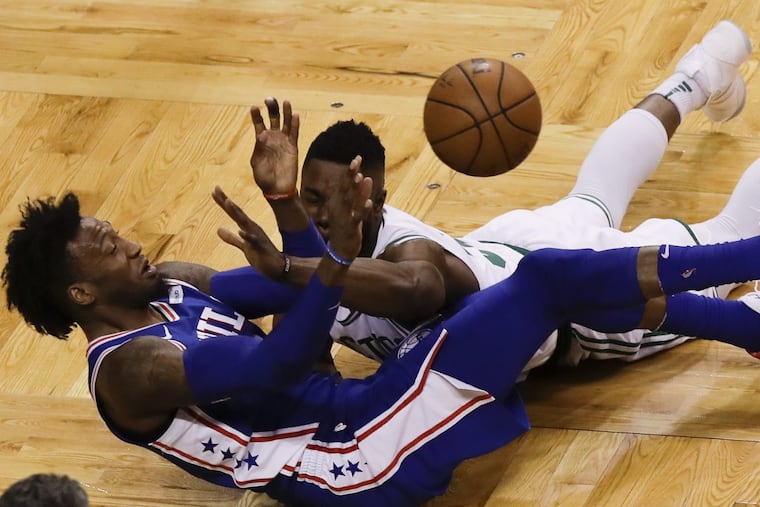Robert Covington's struggles cost the Sixers against Celtics in NBA playoffs elimination | Marcus Hayes
Robert Covington disappeared when the Sixers needed him most.

BOSTON — It wasn't Robert Covington's fault.
At least, it wasn't all Robert Covington's fault.
Whatever value he accrued in his first four seasons had completely diminished after the Celtics took a 3-0 lead in the NBA Eastern Conference semifinals. Playing Covington at all in the last two games was indefensible, which is a damning thing to say about a player with his reputation as a defender.
In a stretch of 2 minutes, 41 seconds near the end of the first quarter of Game 5, RoCo went loco: turnover, bad shot, turnover, then dumped by rookie Jayson Tatum, the kid he was supposed to shut down — the kind of kid Covington is paid to shut down every night.
With 22.5 seconds to play in a tied game, Tatum scored a layup that set up the 114-112 win and gave the Celts the series. Coach Brett Brown said that Covington had played good defense in the series, but a good defender would have been on the floor. In their moment of need, Covington wasn't. The Sixers simply couldn't trust him to be there.
He had played that badly.
When Covington went for a head fake on a three-pointer at the end of the first half and flew past point guard Terry Rozier — he's 7 inches taller than Rozier, who is 6-foot-2 — which left Rozier free to splash a three before intermission, even his Lord Protector had seen enough.
Brown benched him further.
After playing poorly in the first three games, Covington, a forward, already lost his starting spot to spunky point guard T.J. McConnell. After playing even worse in the first half of an elimination game, Covington watched Justin Anderson take his place as the first man off the bench.
"I don't pay attention to that," Covington said.
If true, that's worse than a fib. A player who doesn't pay attention to his role changing is a player who shouldn't have a role.
It was incredible that Brown, a sensible man in most matters, had stayed with Covington so long. Perhaps it had something to do with loyalty. Covington was a constant on the atrocious, 10-win team from two seasons ago, and also on the promising, 28-win team from last season.
In sports, loyalty is a fool's luxury.
Perhaps it had something to do with familiarity. Brown created Covington, turned him from a D-League standout into a real NBA player in four full seasons. He is the most heartwarming story from the depths of The Process.
In Covington's case, familiarity has bred contempt for Sixers fans.
For a visionary coach, Cov love has been a crippling blind spot.
Covington did manage nine minutes in the second half and played 20 in the game, but that was about a 33 percent reduction from the regular season and the first eight playoff games of his career. Maybe there's something to that, too. This was Covington's first playoff run.
There is no way to project the effect the playoffs will have on any player. This first trip for this generation of Sixers proved Joel Embiid and Dario Saric to be warriors. It proved McConnell to be an inspiration.
It proved point guard Ben Simmons to be a power forward.
And, of course, it proved that Covington is a nice bench player for a good team. Maybe this team. Maybe not.
To his credit, Covington accepted his share of the blame.
"Just rushed shots. Shots weren't falling. I know I was missing shots," he said. "I could have performed better in this series."
Why did he rush the shots?
"They crawled into his stomach," Brown said.
The Celtics crowded Covington, the way they crowded every other Sixers shooter. But the other Sixers shooters made them pay by driving past them to the basket and either scoring or passing to an open teammate. Covington cannot do that.
Brown said Covington will spend his summer improving his ability to get to the rim and make shots once he's there. Covington said his trainer will arrive Thursday and they will start to work next week.
This is not a new issue. They should have started last year.
Sixers would be leading this series if Covington had been the best Covington he could be. Instead, they have no one to defend Tatum and Jaylen Brown, who is in his second season, and who is a strong argument that the Celtics might have won the last two drafts. Mercenary shooters Ersan Ilyasova and Marco Belinelli couldn't get open consistently. Simmons was stymied by a defense designed to make him shoot, which he cannot, and will not.
But Covington … well, he had his chances. At his best, he is an X-factor, a difference-maker, a 3-and-D dagger man. This series was made for him to prove his value, which the Sixers set high. He signed a 4-year, $62 million contract extension Nov. 17, scored 20 against Golden State the next night, after which his three-point accuracy stood at 48.7 percent through 15 games, and that's what matters most since he shoots nearly twice as many three-pointers (6.9 per game) as he shoots two-pointers.
He made just 33.9 percent of his threes the rest of the season. He had made 32.1 percent in the nine playoff games entering Game 5 last night, 23.8 percent against the Celtics. He went 1-for-3 in Game 5 and scored five points. He scored five points or fewer in four of the five games.
He hit 6-for-24 threes in the series, but, subtracting Game 2, he was 2-for-17. He scored 34 points against the Celtics in five games, a 6.8 average, a little more than half of his regular-season output.
That was all his fault.